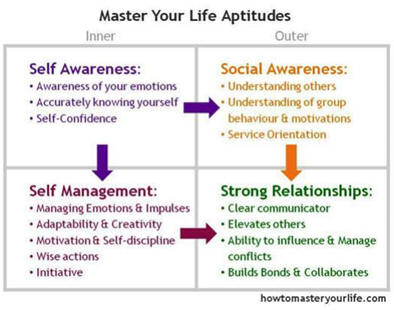Have a question or comment? Branding yourself
|
|
Billw@projectAcademy.org |
Objectives for Learning about Branding :
1) understand both what personal branding means and what it means to be a brand
2) establish themselves on at least two social media platforms
3) define a brand mission statement for their personal brand
4) build a board of directors for their brand
5) become familiar with the basics of digital security and reputation management
6) create a routine for on-going brand maintenance
Watch these videos to get a better ideas of Branding
Read This Article
Self-confident people have several key traits that others don’t. For instance, they believe that they can achieve what they put their mind to. They do not talk negatively to themselves, they don’t criticize their own performance, and they don’t compare themselves to others – they simply believe in their own talents.
They are happy with the way they are, but they know that, if they try, they can be even better. And they do try, again and again. They do not give up, because they celebrate everything that they do – with gusto!
Define strengths A strength is an activity that makes you feel strong. A strength is not just something that you are good at. That’s a skill. A strength is an activity that you’re good at and that gets you excited. A weakness, on the other hand, is something that makes you feel weak. You may be good at it, but the activity drains you. (Provide personal examples.) Identifying Your Strengths
• What are 3 things you are naturally good at?
• What knowledge or expertise do you have?
• Which personal characteristics are you most proud of?
• Think about what you have done in the last week. Do you feel like you are spending more time in your areas of strengths or weakness?
• How can greater self-awareness of your strengths influence the decisions you make about the future?
You’re probably familiar with goal setting as a
great way of organizing yourself for achievement. Setting and achieving
goals (and taking the time to celebrate their achievement) is a powerful
way of building your self-confidence. After all, if you’ve worked hard
to achieve these goals, you’ve earned the confidence that comes with
success! The more goals you achieve, the more confident you become, and
the greater the chance will be that you’ll achieve even more of your
goals. This shows how powerful goal setting can be.
Life Goals The first step is to set life goals. These are
extremely important, as they point you in the right direction, and they
allow you to achieve successes along your journey. (You can also use
them to achieve the vision of yourself that you created with your
affirmations in Section 2.)
Short-Term Goals The second set of goals complements your life
goals and builds your confidence. They have a short-term focus, and
achieving them will help you feel good about what you’re doing each day.
You can base your initial short-term goals based on the reframing
exercise you completed in the previous section. These goals are not
fixed – it’s important to continue developing them, especially when you
miss targets or don’t achieve what you intended to. This way, you’ll
provide yourself with an up-to-date, steady supply of goals and
accomplishments that will help you to build your confidence and
self-esteem.
Branding:
Each of us is unique, with a mind, strengths, and experiences that are powerful self-brand assets. Anything that you have ever done or thought about could be an asset. If you think it is an http://websterampersand.com/branding-yourself/ asset, it is. If you see it as a stepping-stone to your self-brand goal, it is. If you see it as a career buster, it is.Few of us have been taught to think of ourselves in terms of being a brand, as something that can be looked at in different ways, developed into a winning brand, and marketed so that we may achieve our full potential.
Few have learned how to rebrand ourselves to stand for something that is in demand rather than something that is no longer in vogue. We don’t know how to create positive perceptions of ourselves. Nor have many of us been taught that we are capable of defining and molding our jobs. We can even create careers and career paths that we feel passionate about.
It’s not that ability and performance aren’t important. They are. But a talented, hardworking person won’t do as well as a well-branded, talented, hardworking person. Effective branding will tip perceptions in your favor and bring greater success.
Example page of a Brand Statement: (My Brand)
| Overview |
|
|||||||||||||||
|
My Attitude
Realize that you’re unique and one of a kind. You were created to make a mark in this life and not just born to survive
|
See the positive or good in things. Look to make things better, building a community.
Self-confident people have several key traits that others don’t. For instance, they believe that they can achieve what they put their mind to. They do not talk negatively to themselves, they don’t criticize their own performance, and they don’t compare themselves to others – they simply believe in their own talents. They are happy with the way they are, but they know that, if they try, they can be even better. And they do try, again and again. They do not give up, because they celebrate everything that they do – with gusto!
|
|||||||||||||||
|
My Goals in life
|
Life Goals The first
step is to set life goals. These are extremely important, as
they point you in the right direction, and they allow you to
achieve successes along your journey.
|
|||||||||||||||
|
About Self:
|
|
|||||||||||||||
|
My Brand
|
Who am I and how do I want others to see me? Each of us is unique, with a mind, strengths, and experiences that are powerful self-brand assets. Anything that you have ever done or thought about could be an asset. If you think it is an http://websterampersand.com/branding-yourself/ asset, it is. If you see it as a stepping-stone to your self-brand goal, it is. If you see it as a career buster, it is.
Few of us have been taught to think of ourselves
in terms of being a brand, as something that can be
looked at in different ways, developed into a winning brand, and
marketed so that we may achieve our full potential: Jay Shetty's Free "Discover Your Strengths' Mini Class 1. What are my skills, expertise, talents? 2. When have you observed me display these? 3. What impact have I made in your life?
|
|||||||||||||||
|
Social and Emotional Learning Review & Understand |
|
|||||||||||||||
|
Outcomes
Avoid: abject hatred, malice, and unpleasantness
|
Having developed skills like; Trust, Respect, Independence, Collaboration, and Kindness, Listening, Empathy.
|
|||||||||||||||
External courses (like Coursera):
|
Branding |
|
||
Remember: This is a living document that needs to be review (Reflection) and updated from time to time
Web Page Resources for Training



